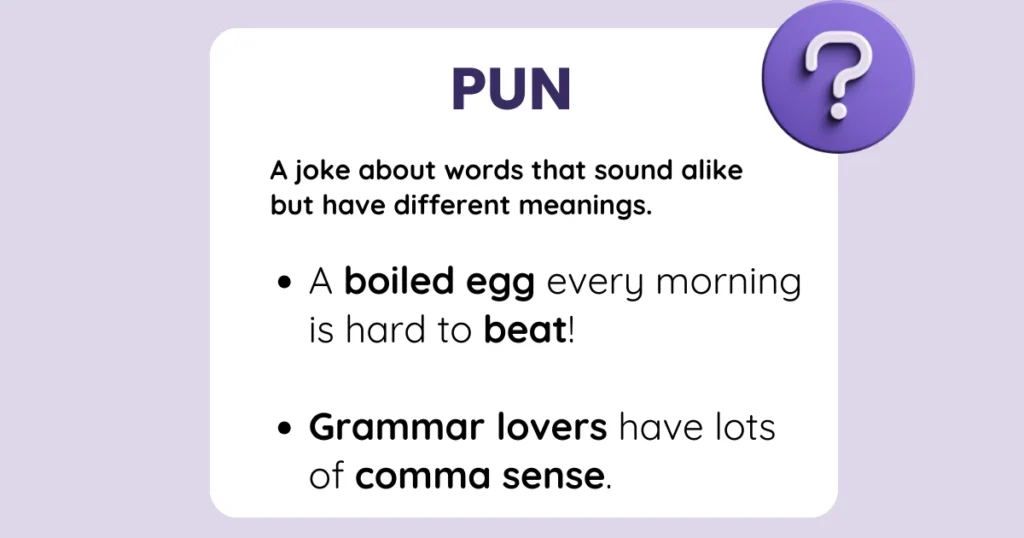What’s a pun, exactly?
Why did the unicycle take a nap?… Because it’s one tired bike!
What do you call a broken pencil? Pointless.
German sausage jokes are just the Wurst.
Notice anything in common with the jokes above? You can infer from the article’s title that these are all puns, which is a literary device that uses wordplay (words with multiple meanings)

Puns are “jokes that exploit the different possible meanings of a word or the fact that there are words which sound alike but have different meanings”. If the above explanation leaves you confused, what’s below should clarify all things on this punny part of speech, the inimitable pun.
Meaning of pun
| Word Form | Examples |
|---|---|
| Other | “A Conceit arising from the use of two Words that agree in the Sound, but differ in the Sense“. – Addison
“An expression in which the use of a word in two different applications, or the use of two different words pronounced alike or nearly alike, presents an odd or ludicrous idea“. – Century Dictionary |
Though the writing is somewhat antiquated, the first quote above nicely explains what puns are, “A conceit” (just means confusion), that arises from words that agree in sound (or sound the same). You’ll often hear terms like “wordplay”, “double entendre”, and “pun” associated. Broadly speaking, they all depict confusion that comes from misinterpreting words with multiple definitions or uses. Clarifying the term ‘homophone‘ is especially useful here. Merriam-Webster defines homophones as:
|
“One of two or more words pronounced alike but different in meaning or derivation or spelling (such as the words to, too, and two)”. |
Put more simply, homophones sound the same but have different meanings and can be spelled differently. These words are some of the most frequently confused in English and significantly contribute to the language’s reputation for being unnecessarily complicated.
The term homophone comes from the Greek words, “homo“, meaning “same“, and “phone”, which directly translates to “sound“. You don’t need to be a mathematician to put two and two together to get, “same sound“.
How puns work
Puns are usually a kind of joke, but not all of the time. To understand the mechanics of a pun, the best way is to see one in use. Take a look at the following pun (which is a personal fave).
|
There isn’t much left to make a salad; only the lettuce Romaine’s. |
The pun here is that the words “lettuce Romaine’s” sound like “lettuce remains“, but Romaine is also a kind of lettuce, which makes it a double entendre (play on words). The pun works for two reasons:
- The context agrees with the meaning of both senses of the word.
- The writer intends to confuse the various meanings/word associations.Remember, puns aim to confuse listeners or readers, and they force them to stop for a moment and think twice.
Examples of puns
- How does Moses make coffee? Hebrews it.
- I bought a boat because it was for sail.
- How did the picture end up in jail? It was framed!
- What’s the difference between a hippo and a zippo? One is really heavy and the other is a little lighter!
- I just found out that I’m color blind. The news came completely out of the green!
- Why didn’t the cat go to the vet? He was feline fine!
- What should a lawyer always wear to a court? A good lawsuit!
- The past, the present, and the future walk into a bar. It was tense!
- What do you call a girl with one leg that’s shorter than the other? Ilene.
- What did the buffalo say to his son? Bison.
Words similar to pun (synonyms)
- wordplay
- play on words
- double entendre
- quip
- joke
- double meaning
- calembour
Sources
- Harper, Douglas. “Etymology of homophone.” Online Etymology Dictionary, https://www.etymonline.com/word/homophone. Accessed 4 December 2023.
- “Homophone.” Merriam-Webster.com Dictionary, Merriam-Webster, https://www.merriam-webster.com/dictionary/homophone. Accessed 4 Dec. 2023.
Worksheet
What is a pun primarily described as in the post?
Puns often exploit words that sound alike but have different meanings. What term is used for such words in the post?
According to the post, what is one key element of how a pun works?
Which phrase is NOT typically associated with puns in the post?
The etymology of “homophone” comes from Greek words meaning what?
A pun often exploits words that agree in but differ in sense.
The example “Why did the unicycle take a nap? Because it’s one tired bike!” is a pun because it uses a phrase that sounds like another with a different .
The term “homophone” comes from the Greek words “homo” meaning “same” and “phone” meaning ““.
Homophones are pronounced alike but differ in meaning, derivation, or .
Puns are often a kind of .
FAQs
What is a pun?
+
How do puns work?
+
Are puns always jokes?
+
What is a homophone?
+
How are homophones related to puns?
+
Sources
-
Harper, Douglas. “Etymology of homophone.” Online Etymology Dictionary, https://www.etymonline.com/word/homophone. Accessed 4 December 2023.
-
“Homophone.” Merriam-Webster.com Dictionary, Merriam-Webster, https://www.merriam-webster.com/dictionary/homophone. Accessed 4 Dec. 2023.
Yash, D. "How to Use a Pun (Explanation, with Examples)." Grammarflex, Aug 30, 2025, https://grammarflex.com/whats-a-pun-meaning-with-examples/.








